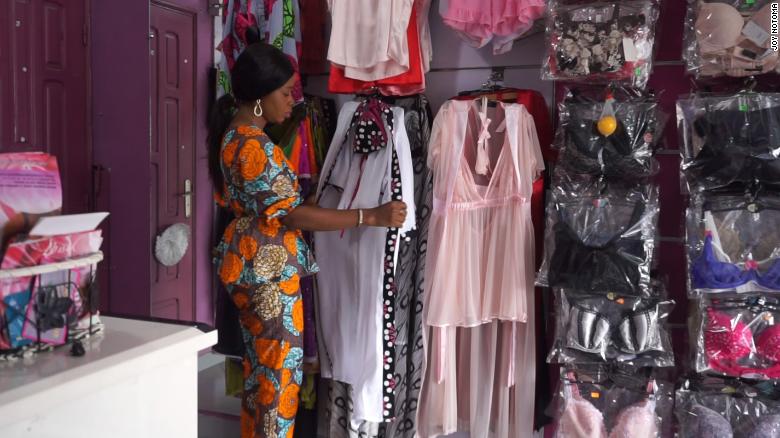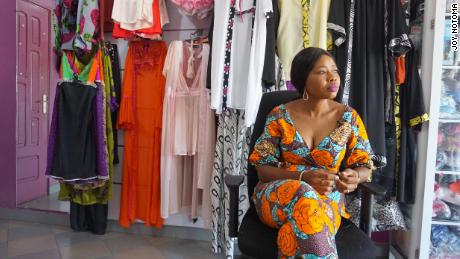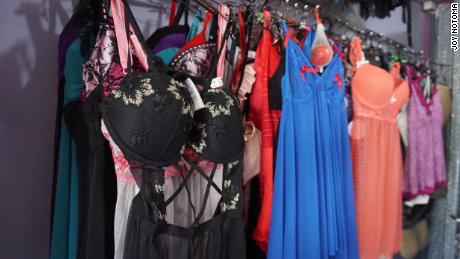She opened a sex shop for women, then the backlash started
Updated 0014 GMT (0814 HKT) November 24, 2018
CNN is committed to covering gender inequality wherever it occurs in the world. This story is part of As Equals, a year-long series.
Cotonou, Benin -- "I am in the business of pleasure," 33-year-old Antares Adjibi said, a blue dildo and silicone breasts sitting on a shelf behind her.
Adjibi's sex shop in the heart of Cotonou is an unlikely enterprise in Benin, a west African country steeped in tradition and religion.
Nearly half of the population is Christian, almost 28% is Muslim, while more than 11% practice Vodun, or Voodoo, which originated in the region of the French-speaking West African nation and is widely regarded as its birthplace.
There are a few online businesses in Benin which sell sex accessories, but boutiques specializing in the products are uncommon. In neighboring Nigeria, sex shops are growing in popularity in Lagos, but are rare outside of cities.
"Sexuality is still taboo in Africa, particularly in Benin," Adjibi says. "Women don't have freedom of expression. They are not free to express their sexuality."
Adjibi opened her store Abasik in 2013 with the aim of changing that. The walls of the small shop are lined with brightly colored, flowing lingerie for women. The shelves of a separate room are filled with phallus shaped toys, handcuffs, and flesh-colored molds. But Adjibi wanted to do more than sell lingerie and sex toys, so she enrolled in sexual psychology courses and began holding free workshops for women seeking sexual advice. In the years since, she says she has helped to counsel hundreds of couples.
The concept of a sex shop was so novel in Benin that when it was launched, Adjibi was invited to speak on a local radio station about the importance of women's sexual pleasure. The backlash was immediate.
Critics targeted her social media accounts, posting comments like: "What are you talking about? God created sex, so how could anything be wrong?"
Others flagged images of her products so frequently as inappropriate that Facebook temporarily suspended her store's page, a problem that persists even though the images match the content of the articles she posts.
In spite of the online opposition, Adjibi's free workshops are still crowded with women and couples. She estimates that 70% of her clients are single women and the majority come to her for issues regarding pleasure.
Veronique Tognifode, a gynecologist and obstetrician from Cotonou, who works with the Association for Education, Sexuality and Health in Africa (APESSA), says that taboo associated with sex, and speaking about sexuality, is slowly changing in Benin.
Four years ago, she began answering students' questions about sex in schools across the country.
"The goal is to promote responsible sexuality, but it's also a way to generate more communication around sexuality so they are given answers without taboo," Tognifode said.
And the topic of pleasure is becoming more relevant, according to Tognifode. She says she often fields questions about sexual health and sexually transmitted diseases, but that queries about masturbation and introducing objects during sex are becoming more frequent.
"Because of social media, young people have access to information. But it's not just knowledge, it's also braving the taboo of asking more questions," Tognifode said.
A joint study by medical professionals from Benin, Sierra Leone, and The Democratic Republic of Congo surveyed 500 young people from Cotonou and found that sex solely for procreation is becoming less of a priority for young people. Half of the young men surveyed said that they have sex just for pleasure and half of the young women said that they have sex for love.
Adjibi says that the types of questions Tognifode gets take a bit of coaxing from customers in her store. Women frequently browse lingerie until an employee asks if they want to see the toys because they are too embarrassed to ask for themselves.
Adjibi told a client who said she had a stronger sex drive than her husband that she should express to her partner when she's in the mood.
"I can't just tell him that I want him. Women don't do that. Women can't just say 'I want you to make love to me.' It's impossible," Adjibi said the customer responded.
It's an attitude that Adjibi tries to address in her workshops.
"Women have the power to show their partners that their job isn't just to have children. They can be a life partner, a lover, an adviser," she says.
In Benin, sexuality is typically only discussed in relation to sexual health because, despite a growing interest in safe sex, contraceptive use remains relatively low, according to a 2017 study of Benin in The Central African Journal of Public Health. This presents a barrier to how effectively women can plan pregnancies, which has a direct bearing on quality of life.
Lissette Coovi, a pharmacy director from Cotonou realized two years ago that a growing number of her customers were asking for products to improve sexual pleasure.
In response, she suggested that her cousin and his partner move to Benin to start an online sex toy business. The couple moved from France almost two years ago and started a business selling sex toys and accessories, called Smielo.
Customers can peruse products on their website and pick up purchases in a backroom at one of three pharmacies, all located in Cotonou. Going around back to pick up a sex toy doesn't raise suspicion since many pharmacies already have a backroom where customers can ask private questions of the pharmacist. All of the products come in discreet packaging with only the company's name.
"Most communication with clients is via text. When clients come to the pharmacy, they're very embarrassed, so they prefer to only interact with one person to maintain as much discretion as possible," Coovi said.
But Antares Adjibi says this discretion only feeds the taboo, which she believes hurts women the most. Though the inquiring shopper can find sex toys and lingerie in shops which also carry a hodgepodge of other products in the country's largest market, Dantokpa, it's Adjibi's insistence of the importance of sexual pleasure for women that makes her stand out.
"I tell my clients that they can't be afraid. They aren't doing anything wrong by learning about their bodies and sexual pleasure," she said. "Our ancestors did things differently, but if we want to change our lives for the better, we have to take the risk. I won't hide."







